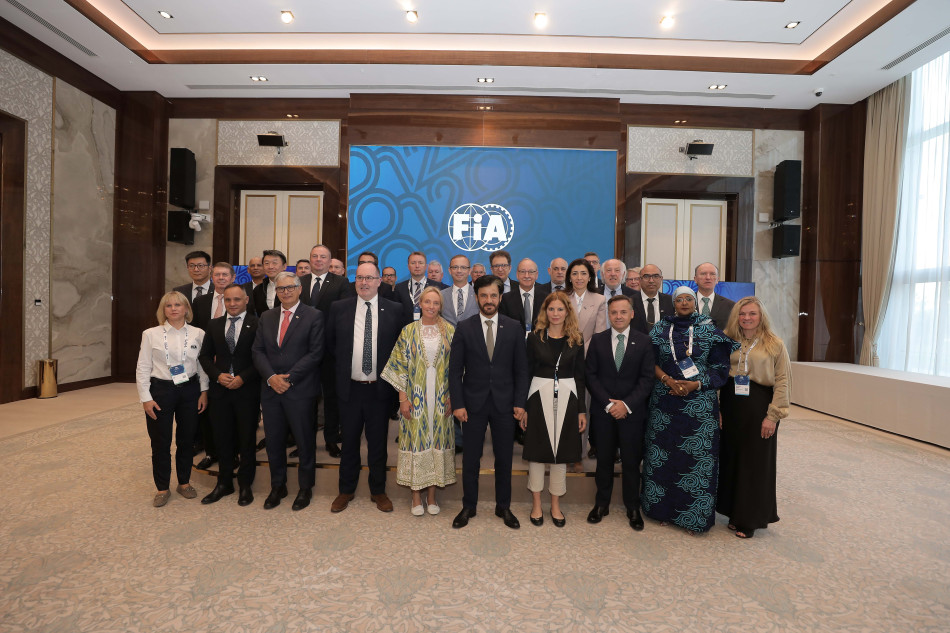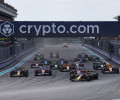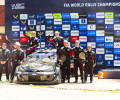Stability for WRC and 2026 regulations in Formula 1 top of the FIA World Motor Sport Council agenda in Samarkand
Technical regulations for Rally1 and Rally2 cars to remain stable for next two seasons with strong focus placed on finalising 2027 regulations
WMSC will conduct e-vote on 2026 Formula 1 regulations in coming weeks
Opportunity for manufacturers to produce up to 300 exclusive GT3 homologation road cars with FIA branding

The FIA World Motor Sport Council convened for its second meeting of 2024. The meeting was chaired by President Mohammed Ben Sulayem with FIA Deputy President for Sport Robert Reid and WMSC members joining in person at the 2024 FIA Conference in Samarkand, Uzbekistan, and via video conference.
In his opening address, the FIA President thanked the National Autosport and Karting Federation of Uzbekistan (NAFKU) for hosting the World Council and FIA Conference in Uzbekistan, and reported on significant progress since the previous WMSC gathering which took place in February at the Federation’s offices in Geneva.
Welcoming and thanking the Members for their efforts, the President addressed the council, saying:
“Halfway through 2024, it is time to reflect on the work we have done, and the work still to come. In sporting, we have seen growth across each of our Championships as calendars are expanded, and we continue to increase grassroots opportunities, encouraging accessible and affordable participation.
"Today, I announced a new Karting strategy which will be launched later this year. Karting is the backbone of all motor sport, the start for many of our world champions, and I am committed to its continued growth.”
President Ben Sulayem also shared details of the FIA’s year-end financial report, noting:
“I am pleased to share that the report was concluded by April for only the second time in our history. Through the implementation of a strong commercial strategy and a streamlined accounting process, we continue to see a reduction in our deficit.
We are successfully meeting our objective of creating a truly global, financially stable, member-led federation, and I look forward to this continuing across the remainder of the year.”
Technical stability agreed for FIA World Rally Championship
Technical stability has been agreed between all stakeholders for the 2025 and 2026 FIA World Rally Championship seasons. The World Council has confirmed that, following extensive feedback and discussions, the WRC Technical Regulations for Rally1/2 cars will remain unchanged for the coming two years.
All stakeholders are working positively together on the direction of the regulations for 2027 and beyond, and there is a good consensus between the World Council members and the manufacturers on the key targets that are aimed primarily at increasing participation at the highest level as previously set out by the FIA. It is a strong expectation of the World Council that the current manufacturers will commit to the long-term future of the sport well in advance. These regulations will be presented for approval at the December meeting of the World Council, allowing more than two year’s lead time for manufacturers to adapt.
Following a clear pledge to invest from the WRC Promoter, the FIA will strengthen its team across the Commercial and Communications Departments to extend their support for the Promoter and the key stakeholders around the Promotional Working Group.
There will be a strong focus on managing the sporting regulations following the creation of the WRC Sporting Working Group, with a key emphasis on increasing the opportunities for media activation and reducing the costs for its competitors. The final versions of these Sporting Regulations are to be proposed in the October session of the WMSC.
FIA President Mohammed Ben Sulayem commented on these conclusions, saying: “The WRC is hugely important to the FIA, it is the pinnacle of the rally discipline and I have had a lot of conversations with the manufacturers over the past weeks about its future direction. It is clear now that we all need to have technical stability for the next two years, but at the same time it is important for the FIA that, in providing this stability, we receive the same positive commitment from the manufacturers.”
Speaking in reaction to this confirmation by the World Council, other WRC stakeholders have also added their thoughts.
WRC Promoter Managing Director Jona Siebel said: “As the WRC Promoter this is a hugely important moment for us, as we can move forward with unity and consistency over the next two years from a technical perspective while we are investing heavily in new and exciting ways to grow the fanbase of the sport and deliver for our fans.”
Jari-Matti Latvala, TOYOTA GAZOO Racing World Rally Team Principal said: “We have a very solid commitment to the World Rally Championship, and we are really supportive of a continued collaborative approach to ensure the strongest competition for all of us.”
Hyundai Motorsport President and Team Principal Cyril Abiteboul said: “We have worked very closely together with the FIA over the past months and while we all believe that stability of the technical regulations for 2025 and 2026 is the right thing, the very substantial steps made on the governance will provide for a more unified and positive approach towards the short term improvements and long term breakthroughs that we all agree the sport needs.”
Malcolm Wilson, M-Sport Ford World Rally Team added: “This is a really positive step for us in the coming years. We have seen some good proposals on the promotion side, on the marketing side and the plans for event operations and now the work to make those things happen needs to start, and with a consistent proposition on the technical side, I think the scope is there to achieve our ambitious targets for the WRC.”
Anna Nordkvist, General Manager of Rally Sweden, said: “From the side of the organisers, there are a lot of positive initiatives starting now that are going to bring a big benefit to the sport and the fans. All of the rallies are different, but with more flexibility and more focus on the fan experience, everyone will benefit. The work being done on the Sporting Regulations is really important for us.”
Thierry Neuville, Driver for Hyundai Motorsport, said: “It is good to hear today that we have the stability the teams have requested and from the meetings we had in Sardinia, it looks like there are some interesting proposals on the table for the future development of the sport. In addition to this, the FIA’s increased promotional efforts promise to elevate our sport’s profile and deliver greater value to all stakeholders. As a driver, I am excited to see the changes that will not only maintain but enhance our connection with fans worldwide, ensuring that the sport continues to grow and thrive.”
Additionally, the World Council approved that, for promotion purposes, two designated team personnel for each registered manufacturer will now be allowed to be present within one kilometre of their competing cars on road sections for filming and social media content creation. Additional positions in the car were also accommodated for the fitting of onboard camera lens.
To provide continuity and stability in the Junior WRC Championship, the extension of the exclusive car supply contract (M-Sport Poland Ford Fiesta Rally3 EVO) for the 2025 season was approved.
Strategic vision and future regulations for Formula 1
FIA President Mohammed Ben Sulayem reaffirmed the strategic partnership between the FIA and Commercial Rights Holder that is vital to the long-term prosperity of the sport. Formula 1 President and CEO Stefano Domenicali also highlighted that there is a strong commitment to the entire single-seater pyramid that will involve greater investment in the grassroots of the sport moving forward.
The World Council received a detailed presentation of the proposals for the 2026 Sporting and Technical Regulations, the broad principles of which were presented to the public during the recent FIA Formula 1 Canadian Grand Prix. Following this presentation, the World Council will undertake an e-vote on the proposals in the coming weeks.
An overview of the significant regulatory changes can be found here.
Motor sport inspired road cars
The FIA’s GT3 regulations have proven to be hugely successful in international, regional and national championships around the world, and as such the FIA has been in discussion with the broad range of automotive manufacturers to explore ways to transfer this incredible success on the race track into unique and exciting products for the road.
In order to homologate a Grand Touring Car (GT) for competition in the GT3 category, manufacturers must produce at least 300 road-going units of the model, and following these discussions with the manufacturers, the first step towards creating an official, direct link between GT3 race cars and their road car homologations has been taken.
The World Council has approved an update for GT3 cars from 2025 that will, upon the manufacturer's request and with the FIA's agreement, allow for up to 300 road cars to utilise FIA branding either on the bodywork or within the cabin. Additionally, each car bearing an FIA logo will be assigned a distinctive serial number for identification purposes.
This will give manufacturers an opportunity, should they choose, to create an even more exclusive limited run of road cars, linked to FIA competition and uniquely recognised by the Federation.
Regulatory updates
ABB FIA Formula E World Championship
World Council members have also agreed to the creation of an ABB FIA Formula E World Championship title for Manufacturers in addition to the existing titles for Drivers and Teams, to ensure attractiveness for manufacturers homologating a car.
The Technical Regulations have also been updated to allow for the use of four-wheel drive on the GEN3 Evo car in specific scenarios such as qualifying duels, race start and Attack Mode from the 2024 – 2025 season onwards.
The 2024/25 calendar was approved as follows:

FIA World Rally-Raid Championship
Following the approval of the Cross-Country Rally Sustainability Roadmap by the World Motor Sport Council in December 2023, the FIA World Rally-Raid Regulations were updated to include the requirement for manufacturers and event organisers to adhere the FIA Environmental Programme, which sets a compulsory two-star level of Accreditation when entering the championship and three-star from 2027.
The criteria defining the start order selection after the prologue have been revised to allow the top ten of the leading group, which will include all Platinum and Gold drivers with Ultimate cars, from the Prologue classification to choose their start position for Stage 1, with the fastest driver being the last to choose his position within the leading group. The aim of this proposal is to prevent unsporting tactics and increase the interest in the start order selection process.
A Power Selective Section will be implemented into event itineraries, optionally in 2025 and with mandatory application from 2026, with the intention to replicate the success of the WRC and ERC Power Stage in rally and provide to the Promoter and organisers an opportunity for live broadcast and increased exposure.
To improve competitors’ safety, particularly in dune stages, W2RC cars in the Ultimate, Challenger, SSV and Stock groups will have to be fitted with a red/orange reflective flag displayed at least 2 meters above the roof, where indicated in the supplementary regulations of W2RC and Baja events. Difficult overtaking zones, where crews are not allowed to request the preceding vehicle to give way, will also be specified in the road books to avoid dangerous manoeuvres or the unfair application of penalties.
On the side of promotion, W2RC drivers will be able to choose a permanent race number, with the numbers 200, 300 and 400 reserved for the reigning World, Challenger and SSV Champions respectively.
FIA Motorsport Games 2024 – Valencia
World Council members confirmed the choice of ETS Racing Fuels as single fuel supplier for Karting Sprint Senior, Junior and Mini Categories, as well as for GT, GT Sprint and Touring Car. Karting Categories will use 100% sustainable fuel whilst GT, GT Sprint and Touring Car competitors will be supplied with 50% sustainable fuel.
FIA CIK – International Karting Commission
Grassroots opportunities continue to increase, encouraging accessible and affordable participation. Notably the African Karting Cup, introduced in February, saw over 60 competitors taking part from 9 African nations.
As the FIA focuses on this growth, it was confirmed to the council that President Mohammed Ben Sulayem has requested a new FIA Karting Plan to be created.
Providing a roadmap to the sport for all involved, the new plan will look at karting’s pathway into major championships and will be delivered later this year.
Cross-Country Rally
As for the W2RC Regulations, the Cross-Country Rally Regulations were also revised to include adherence to the the FIA Environmental programme. The two-star level of Environmental Accreditation will be compulsory for World Baja Cup organisers when entering the championship, and three-star from 2027. Two-star will be compulsory from 2026 and three-star from 2028 for Regional Baja Cups.
As part of the proposals submitted by the Road Sport Committee, a new, less restrictive set of technical regulations for the Stock group – the former T2 – will allow manufacturers to homologate cross-country vehicles based on modern 4WD standard vehicles, modified to increase their capability and reliability, with a controlled budget for the customers.
With the direction given by FIA President Mohammed Ben Sulayem, revised technical regulations were also approved for the SSVs – formerly T4 – with the aim to come back to less transformed and more affordable vehicles compared to the current competition cars and to offer a genuinely accessible access class.
Updates to the 2024 calendars of the FIA World and Middle East Baja Cups were approved. Click here to view the changes.
Regional Rally
Following the approval of the Rally Commission Sustainability Roadmap, approved by the World Motor Sport Council in December 2023, the Regional Rally Sporting Regulations were updated to include the requirements of the FIA Environmental Programme related to the use of fuel, tyres and environmental accreditation.
Updates to the 2024 African Rally Championship calendar were approved. Click here to view the changes.
Governance
The Council agreed to redefine the definition of ‘misconduct’ within the ISC following recognition that there have been an increasing number of incidents in which high profile participants have made statements towards officials that incite abuse. In response, the definition has been strengthened to encompass these scenarios.
It was also noted that, in this respect, abuse must also refer to online abuse and hate speech which will now be referenced directly.
New Sustainability, Diversity and Inclusion Roadmaps to integrate social impact
As part of the SDI Roadmap, updated plans were presented to the council detailing achievements in this space. Notably, plans were announced to integrate social impact in the revised SDI roadmap from 2025, emphasising a stronger commitment to diversity and inclusion.
Commitments of note included:
Aim to achieve equal opportunities for people with disabilities by 2040
Continued support for gender diversity, aiming for a balanced overall representation by 2040
Doubling motor sport participation rates with a focus on promoting equal chances for people from underrepresented groups.
New Format for FIA Annual Report
The Communications Department presented the new, all digital Annual Report which will be launched for the first time on Friday after approval by the General Assemblies. It will include the key sporting highlights of the FIA’s motor sport disciplines along with key content and insights from the previous year.
Upcoming World Motor Sport Council Meetings:
Date | Venue |
17 October | Virtual |
11 December | Within the FIA General Assemblies week framework |

 Facebook
Facebook Twitter
Twitter






